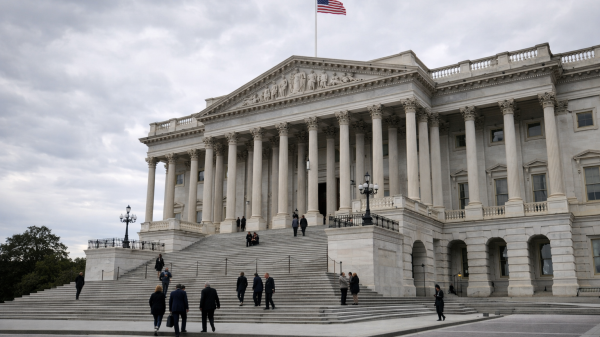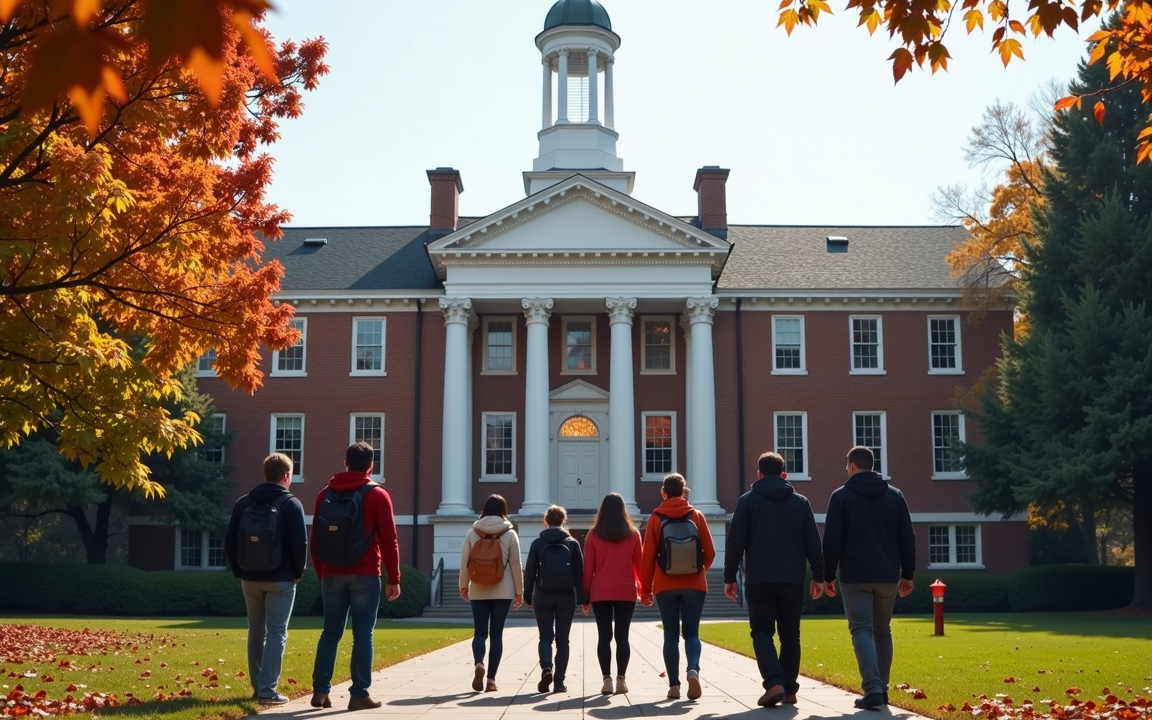Harvard University finds itself at the epicenter of an escalating confrontation with the Trump administration, which has been methodically ratcheting up pressure on elite US colleges to enact sweeping policy changes.
Framing its actions as an initiative to combat campus antisemitism and enforce civil rights protections, the administration has employed coercive tactics, including the rescission of federal funding and the revocation of international student visas, with Harvard bearing the most significant brunt of these measures.
The dispute, a stark illustration of the tension between academic independence and governmental oversight, has seen the Trump administration freeze over $2.6 billion in federal research grants previously allocated to Harvard.
This drastic step was taken in response to the university’s refusal to overhaul its governance, disciplinary procedures, hiring practices, and admissions policies to align with the White House’s agenda.
Furthermore, the administration revoked the certification of Harvard’s program for international students, effectively barring them from attending the institution.
The pressure on the Ivy League institution shows no signs of abating, with potentially more punitive measures on the horizon.
President Trump has publicly stated his intention to strip Harvard of its tax-exempt status, a benefit that, according to a Bloomberg News analysis, saved the university at least $465 million in 2023.
Adding to this financial vise, the Republican-led House of Representatives has passed legislation that includes a significant tax increase on the net investment income from private college endowments, a measure that would directly impact Harvard’s substantial endowment.
In response, Harvard has filed a lawsuit, alleging that the government’s actions threaten its institutional independence and stifle free speech by suspending federal research grants.
The university has also called the block on foreign student enrollment unlawful.
The genesis of the conflict: “antithetical values” and antisemitism allegations
President Trump has long been a vocal critic of elite universities, which he contends foster ideas “antithetical to American values” and maintain policies that violate laws prohibiting racial discrimination.
During his 2024 election campaign, Trump threatened to use “taxation, fines and lawsuits to shrink ‘excessively large private endowments’” and vowed to “reclaim our once great educational institutions from the radical Left and Marxist Maniacs.”
His administration’s criticism of Harvard, America’s oldest and wealthiest university, has primarily centered on its alleged failure to adequately combat antisemitism.
Harvard’s campus, like many others nationwide, experienced a prolonged period of turmoil following the October 2023 attack on Israel by Hamas, which the US classifies as a terrorist organization, resulting in 1,200 deaths and over 200 hostages.
The ensuing conflict in the Gaza Strip, which according to the Hamas-run health ministry has led to over 53,000 Palestinian deaths, fueled campus protests and complaints from some Jewish students and external Jewish groups about rampant antisemitism at Harvard.
Alan Garber, a longtime provost, assumed the role of interim president in January 2024 after President Claudine Gay’s resignation.
In August, Harvard appointed him as the permanent leader. Garber subsequently implemented changes in response to the antisemitism complaints, including adopting a formal definition of antisemitism and introducing new educational programming for students.
However, President Trump and other conservative voices argued that Harvard’s measures did not go far enough to protect Jewish students.
In an April 11 letter to the university, the Trump administration identified several Harvard programs, including the Center for Middle Eastern Studies and the Divinity School, that it claimed “fuel antisemitic harassment or reflect ideological capture.”
Further escalating the rhetoric, the Department of Homeland Security, in a May 22 statement, accused Harvard’s leadership of having “created an unsafe environment by permitting anti-American, pro-terrorist agitators to harass and physically assault individuals,” alleging that many of these agitators were international students.
The department also accused Harvard’s leadership of coordinating with the Chinese Communist Party, an allegation echoed by Republican lawmakers in Congress who, in a May 19 letter to Garber, demanded information about the university’s ties to China’s government and military.
The path to stalemate: demands, rejections, and lawsuits
The current funding freeze was preceded by a series of escalating demands.
On March 31, the Trump administration threatened to withdraw nearly $9 billion in research grants due to what it termed Harvard’s failure to “combat antisemitic harassment.”
A federal task force on antisemitism subsequently issued demands on April 3 for governance reforms, presented as prerequisites for continued federal funding.
The April 11 letter detailed the administration’s revised set of demands, which included:
- achieving “viewpoint diversity” in academic departments
- adopting strictly “merit-based” admissions and hiring practices
- eliminating diversity, equity, and inclusion (DEI) programs
- diminishing the influence of faculty perceived as “more committed to activism than scholarship,” and
- banning international students deemed “hostile to American values”
President Garber rejected these demands, stating on April 14:
No government — regardless of which party is in power — should dictate what private universities can teach, whom they can admit and hire, and which areas of study and inquiry they can pursue.
Hours later, the US government froze $2.2 billion in multiyear grants, prompting Harvard to file its lawsuit on April 21.
The situation continued to deteriorate when Education Secretary Linda McMahon informed Harvard on May 5 that it would be ineligible for further federal grants until it demonstrated “responsible management.”
Days later, eight US agencies terminated an additional $450 million in grants to the university, leading Harvard to expand its lawsuit on May 13.
Harvard’s legal stand: defending independence and due process
In its lawsuit filed in Boston federal court against several US executive branch agencies and top officials, Harvard claims the funding freeze violates its First Amendment right to free speech.
The original complaint argued that by withholding federal funds, the government attempted to “coerce Harvard to conform with the government’s preferred mix of viewpoints and ideologies.”
Harvard further contended that the agencies sought to assert undue control over the university and argued that the government cannot supplant Harvard’s own decision-making processes in combating antisemitism.
The suit also alleges that the government violated federal regulations in cutting the funding.
For instance, while the administration invoked Title VI of the Civil Rights Act of 1964 (which bars discrimination based on race, color, or national origin) to justify its actions, Harvard claims the act grants it the right to voluntarily work with the government to correct any compliance failures—an opportunity it says was not afforded before the funds were frozen.
Harvard’s amended lawsuit reiterates these claims, asserting that a wide range of government agencies violated both the First Amendment and the Administrative Procedure Act by abruptly cutting off funding.
The ripple effect: research, students, and finances at risk
The consequences of the funding freeze, according to President Garber in a letter to the Harvard community, will be “severe and long-lasting.”
He highlighted that it will impact crucial research into childhood cancer, multiple sclerosis, Parkinson’s disease, and Alzheimer’s disease.
The lawsuit further states that the freeze will affect the education of thousands of graduate students and postdoctoral fellows in science, technology, medicine, and public health.
In the last academic year, Harvard received approximately $700 million in research funding from various federal agencies, including the Departments of Health and Human Services, Defense, and Energy.
This federal research funding constitutes 11% of the university’s operating revenue, according to Harvard University bond documents for the fiscal year ending June 30, 2024.
(Source: Harvard University bond documents)
To counteract the loss, Harvard has announced it will allocate an extra $250 million of university funds to support research in the coming academic year, supplementing the approximately $500 million it already spends annually.
President Garber is also voluntarily reducing his salary by 25% for the year starting July 1.
While Harvard possesses an endowment valued at over $53 billion, this vast sum is not a readily accessible bank account.
A portion is distributed annually to support the university’s budget, but much of the remainder is restricted for specific purposes or tied up in illiquid assets.
The block on international students also poses a significant financial challenge.
Nearly 6,800 international students, representing 27% of Harvard’s total student body and hailing from over 140 countries (up from 19.6% in 2006), contribute substantially through tuition fees.
For prospective international students, the timing of the visa program revocation was particularly detrimental, as Harvard’s May 1 deadline to accept admission offers coincided with that of most other US colleges.
The tax-exempt question: presidential powers and precedents
On May 2, President Trump declared on his Truth Social platform: “We are going to be taking away Harvard’s Tax Exempt Status. It’s what they deserve!”
This followed weeks of threats regarding the university’s tax status.
In response, four Democratic senators have called for an investigation into whether Trump’s targeting of Harvard violates a criminal law barring the president from ordering the Internal Revenue Service (IRS) to target individuals and organizations with investigations and audits.
They argued in a letter to Heather Hill, the Treasury Department’s acting inspector general for tax administration, that it appears Trump “publicly and repeatedly broke this law when he suggested that Harvard should lose its exempt status for not bending to his will.”
The senators emphasized that under the Internal Revenue Code, an organization cannot lose its tax-exempt status until the IRS conducts a “careful objective review” and the entity has had an opportunity to appeal.
The revocation of a university’s tax-exempt status is not unprecedented, though it is rare and typically follows lengthy legal battles.
Bob Jones University in South Carolina lost its federal tax exemption in 1976 due to its policies banning interracial dating, a decision ultimately upheld by the Supreme Court in 1983.
The university later dropped the policy in 2000 and regained its tax benefits in 2017.
Harvard’s tax-exempt status, like that of approximately 1,700 other non-profit colleges in the US, is granted based on its societal contributions through education and research.
This status provides significant advantages, including the ability for donors to write off contributions (Harvard typically raises over $1 billion annually this way) and the issuance of tax-exempt bonds.
The university also benefits from property tax exemptions on educational buildings, instead making voluntary payments to its host cities.
A broader trend: other universities face similar pressures
Harvard is not alone in facing pressure from the Trump administration.
In March and April, federal funding freezes were also imposed on other elite universities, including Columbia, Cornell, Northwestern, Princeton, and the University of Pennsylvania, citing similar reasons of noncompliance with policy demands and alleged failures to address antisemitism.
Columbia University’s response differed markedly from Harvard’s.
On March 21, Columbia announced it would comply with the administration’s demands to begin negotiations on restoring $400 million in frozen funding.
Concessions included banning masks during campus protests, hiring 36 “special officers” with arrest powers, and placing its Middle Eastern, South Asian, and African studies department under increased oversight.
This contrasting approach highlights the difficult choices universities are facing.
On April 22, over 200 leaders of academic institutions signed a joint letter opposing “undue government intrusion in the lives of those who learn, live, and work on our campuses” and “the coercive use of public research funding.”
The post Billions frozen, visas revoked: how Trump’s war on Harvard could reshape US higher education appeared first on Invezz




































